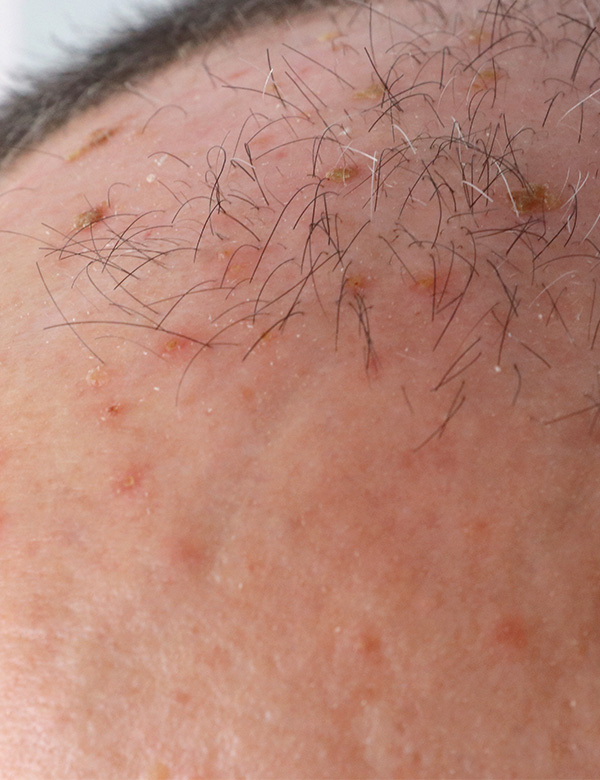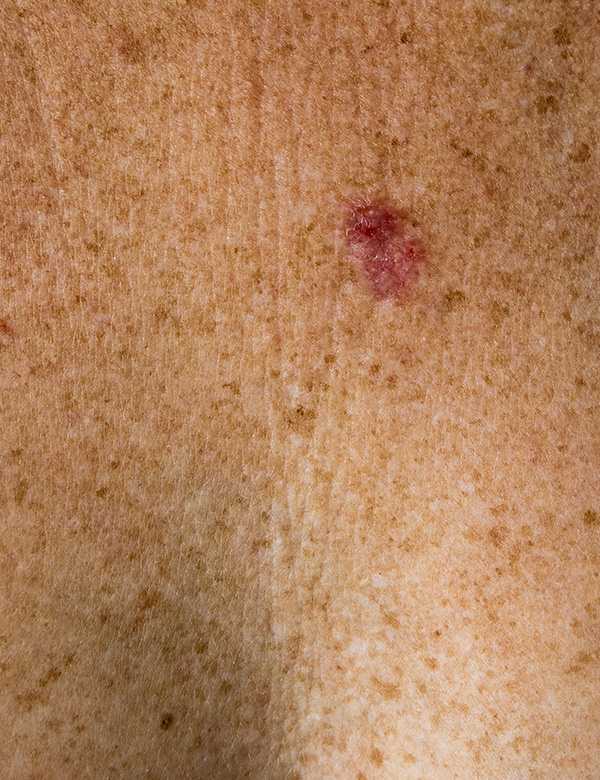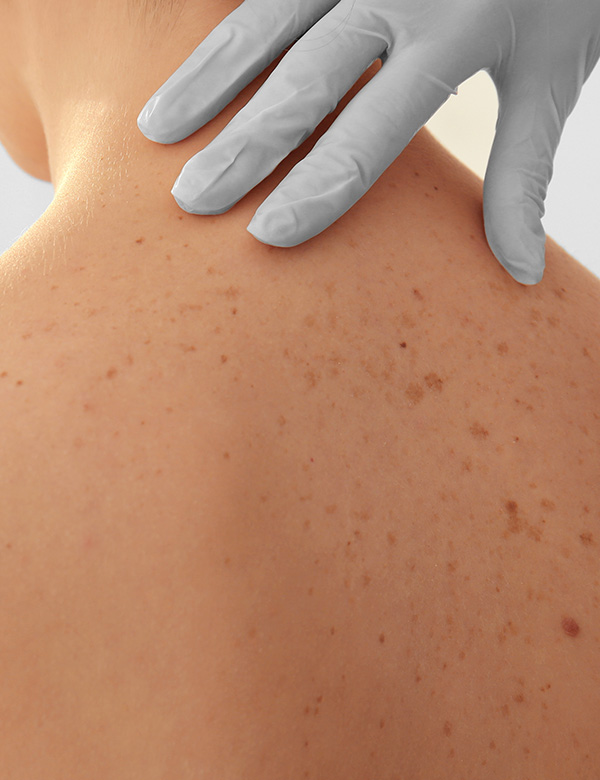melanoma (black skin cancer)
Detect and treat melanoma through expert dermatologists at Derma Medical Clinic in Zurich – Sihlcity
Schwarzer Hautkrebs
Chronische Abszesse und schmerzhafte Knoten durch erfahrenen Hautarzt abklären und behandeln in der Derma Medical Clinic in Zürich - Sihlcity
Early evaluation if melanoma is suspected:
Thorough skin examination, digital imaging with AI-assisted analysis, and in case of suspicious changes: immediate tissue sample and expert treatment on-site
Examinations
Digital full-body skin screening
Dermatoscopy
Procedure
Personal consultation
Thorough check-up
Immediate tissue sample if needed
Duration
approx. 10–30 minutes
What is melanoma (black skin cancer)?
Melanoma – also known as black skin cancer – develops from the skin cells that produce skin pigment (color).
Unlike many other skin cancers, melanomas can spread quickly into deeper layers of tissue and form metastases (spread to other organs).
That’s why melanoma is considered the most dangerous form of skin cancer.
You should especially consider a melanoma check-up if you…
- notice changes in existing moles
- discover new and unusual skin changes
- have a family history of melanoma
- have many moles or very fair skin
Even without known risk factors, we recommend regular checks for early skin cancer detection, especially from age 35.

What is melanoma (black skin cancer)?
Melanoma – also known as black skin cancer – develops from the skin cells that produce skin pigment (color).
Unlike many other skin cancers, melanomas can spread quickly into deeper layers of tissue and form metastases (spread to other organs).
That’s why melanoma is considered the most dangerous form of skin cancer.
Who should get checked for melanoma?
You should especially consider a melanoma check-up if you…
- notice changes in existing moles
- discover new and unusual skin changes
- have a family history of melanoma
- have many moles or very fair skin
Even without known risk factors, we recommend regular checks for early skin cancer detection, especially from age 35.
Treatment
Typical warning signs of melanoma:
- Asymmetrical shape: one half of the mole looks different from the other
- Irregular border: unclear, notched, or uneven edges
- Varied colors: a mole has multiple shades (e.g. brown, black, reddish)
- Diameter over 5 millimeters: large spots should be monitored
- Rapid change: moles that change shape, size or color in a short time
What happens during the exam?
During the skin check-up at Derma Medical Clinic, we use a special magnifying device (dermatoscope) to closely examine your skin. This helps us see details that aren’t visible to the naked eye.
We also take high-resolution full-body photos to document and compare skin changes over time.
We use computer-assisted analysis with artificial intelligence to assess even minor skin changes safely.
What if something is suspicious?
If we find a suspicious mole or skin spot, we can take a small tissue sample (biopsy) directly on-site under local anesthesia in our own surgical room.
The sample is sent to a specialized lab and analysed within a few days. If melanoma is confirmed, we discuss the result with you and plan the treatment together.
In most cases, the tumor is removed promptly in our surgical facility through a minor surgical procedure. For spots in the face, we use gentle techniques such as Mohs surgery to preserve as much healthy tissue as possible.
How does the check-up and treatment work?
Personal consultation
We talk about your skin health, any changes you’ve noticed, past findings, and your personal risk factors.
Thorough skin check-up
Your skin is examined head to toe using a special dermatoscope. If needed, we supplement it with digital images.
If something is suspicious – tissue sample
Immediate biopsy in our clinic if anything suspicious is found.
Treatment if melanoma is diagnosed
Surgical removal under local anesthesia in our in-house operating room.
Ongoing care
Regular follow-up appointments and a personalized aftercare plan.

At Derma Medical Clinic in Zurich-Sihlcity, all examinations and treatments for skin cancer are done exclusively by experienced dermatology specialists:
- Benjamin Miller, dermatologist and phlebologist
- Markus Dendorfer, dermatologist and pediatric dermatology specialist
Both bring extensive experience in early detection and modern treatment of skin tumors.

Dr. med. Benjamin Miller
Board-certified Specialist in Dermatology & Venereology FMH

Dr. med. Markus Dendorfer
Board-certified Specialist in Dermatology & Venereology FMH
What you can expect from us
State-of-the-art diagnostics
Examination with a special magnifying tool (dermatoscope), high-resolution body imaging (Fotofinder Full-Body Mapping), and immediate biopsy if a suspicious skin change is found.
Prompt checks if skin cancer is suspected
Suspicious skin areas are analyzed right away. If necessary, we take a small tissue sample (biopsy) on-site for fast lab testing.
Complete treatment under one roof
If skin cancer is confirmed, the tumor is removed surgically under local anesthesia in our own procedure room.
Cosmetically optimized stitching
All skin surgeries are carried out with special care for an aesthetically pleasing result.
Discreet process & comfort
A private room is available for longer procedures or rest time afterwards.
Gentle methods
Our techniques are designed to be gentle on your skin and preserve the natural look as much as possible.
Have you noticed a new or changing mole or want to have your skin checked regularly?
Book your skin cancer check-up now at Derma Medical Clinic in Zurich – Sihlcity.
FAQ – Frequently asked questions about melanoma
What is melanoma (black skin cancer)?
A melanoma is an aggressive type of skin cancer that develops from the pigment-producing cells in the skin. It can spread early and is considered the most dangerous form of skin cancer.
How can I detect a melanoma early?
- Asymmetrical shape
- Blurred or uneven borders
- Color: multiple shades in one spot
- Diameter larger than 5 mm
- Evolution: rapid change in a mole
What are the first signs of melanoma?
New dark spots, rapidly growing or itching skin changes, or modified moles may be signs of melanoma. In such cases, you should see a dermatologist immediately.
How is a melanoma diagnosed?
The skin is examined using a special magnifying tool (dermatoscope). If a melanoma is suspected, a small sample of tissue (biopsy) is taken and analyzed in a lab.
How is melanoma treated?
In early stages, the melanoma is surgically removed, usually under local anesthesia and on an outpatient basis.
In facial areas, gentle Mohs surgery is used to save as much healthy skin as possible. In advanced cases, additional treatments such as immunotherapy or targeted medication may be needed.
How fast does melanoma grow?
Some melanomas may grow considerably in just a few months. Rapidly changing skin changes should be promptly examined by a doctor.
How often should I have a skin cancer screening?
Experts recommend an annual skin cancer screening by a dermatologist.
If you’re at risk or have had skin cancer before, more frequent checks may be needed.


